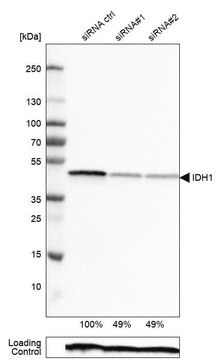MABC1103
Anti-IDH1/2 Mutant (R132/172) Antibody, clone MsMab-1
clone MsMAb-1, from mouse
Synonym(s):
Isocitrate dehydrogenase [NADP] cytoplasmic, IDH, Cytosolic NADP-isocitrate dehydrogenase, IDP, NADP(+)-specific ICDH, Oxalosuccinate decarboxylase, Isocitrate dehydrogenase [NADP], mitochondrial, ICD-M
About This Item
Recommended Products
biological source
mouse
Quality Level
antibody form
purified immunoglobulin
antibody product type
primary antibodies
clone
MsMAb-1, monoclonal
species reactivity
human
technique(s)
immunohistochemistry: suitable (paraffin)
western blot: suitable
isotype
IgG2aκ
NCBI accession no.
shipped in
wet ice
target post-translational modification
unmodified
Gene Information
human ... IDH1(3417) , IDH2(3418)
General description
Specificity
Immunogen
Application
Western Blotting Analysis: The mutant selectivity of a representative lot was tested against purified IDH1/2 MBP fusion constructs as well as lysates from CHO cells expressing exogenously expressed IDH1/2 proteins (Kato Kaneko, M., et al. (2013). Tohoku J Exp Med. 230(2):103-109; Liu, X., et al. (2013). Cancer Med.;2(6):803-814).
Western Blotting Analysis: A representative lot detected exogenously expressed IDH2- R172S, but not wild-type IDH2 or IDH2-H175Y PA fusion proteins in lysates from transfected U2OS osteosarcoma cells (Kato Kaneko, M., et al. (2014). Cancer Sci.;105(6):744-748).
Immunohistochemistry Analysis: A representative lot detected IDH2 R172S mutant, but not wild-type IDH1/2, in paraffin-embedded human GCTB (giant cell tumor of bone) tissue sections (Kato Kaneko, M., et al. (2014). Cancer Sci.;105(6):744-748).
Immunohistochemistry Analysis: A representative lot detected IDH2 R172S mutant, but not wild-type IDH1/2, in paraffin-embedded human osteosarcoma tissue sections (Liu, X., et al. (2013). Cancer Med.;2(6):803-814).
Apoptosis & Cancer
Apoptosis - Additional
Quality
Western Blotting Analysis: 2.0 µg/mL of this antibody detected exogenously expressed IDH2-R172S mutant, but not wild-type IDH2, in 10 µg of U2OS cell lysates.
Target description
Physical form
Storage and Stability
Other Notes
Disclaimer
Not finding the right product?
Try our Product Selector Tool.
Storage Class Code
12 - Non Combustible Liquids
WGK
WGK 1
Flash Point(F)
Not applicable
Flash Point(C)
Not applicable
Certificates of Analysis (COA)
Search for Certificates of Analysis (COA) by entering the products Lot/Batch Number. Lot and Batch Numbers can be found on a product’s label following the words ‘Lot’ or ‘Batch’.
Already Own This Product?
Find documentation for the products that you have recently purchased in the Document Library.
Our team of scientists has experience in all areas of research including Life Science, Material Science, Chemical Synthesis, Chromatography, Analytical and many others.
Contact Technical Service








